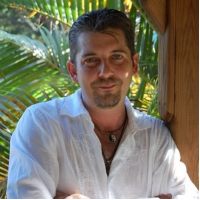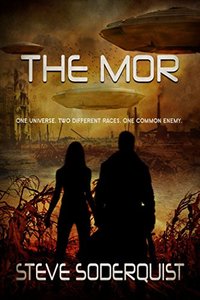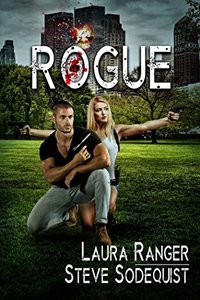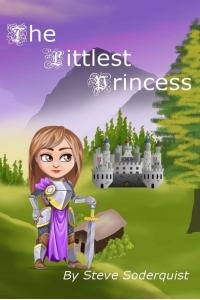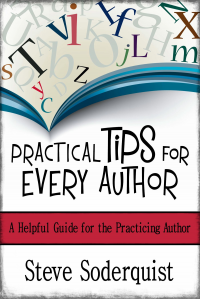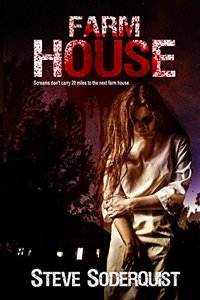Steve Soderquist Interview Published on: 03, May 2017
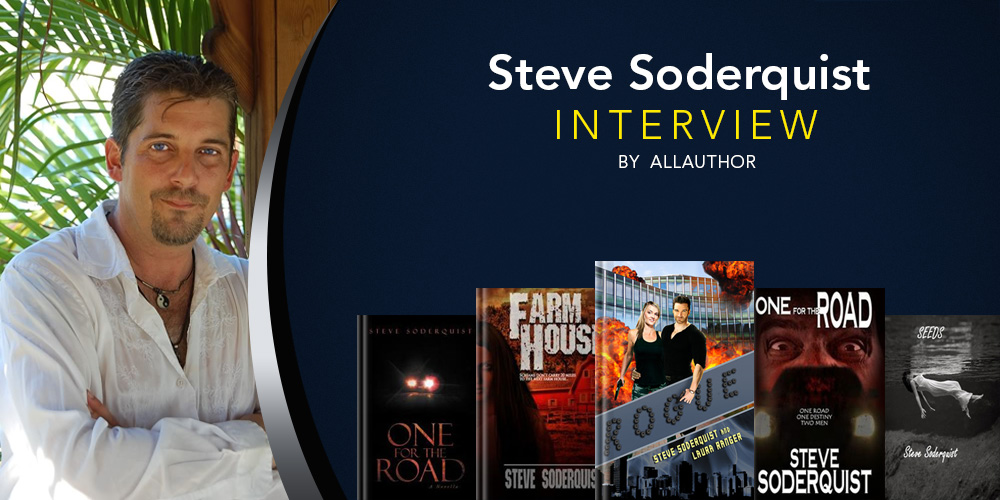 Where did you grow up and what was your childhood like?
Where did you grow up and what was your childhood like?
I grew up in Brandon, Florida, which is about an hour drive to the beaches of Clearwater and Saint Petersburg. I was rather introverted as a kid, and my love of books was evident even at the young age of ten and eleven thereabouts, where I was reading books like Moby Dick, 20,000 Leagues Under the Sea, King Rat, A Clockwork Orange, Anything by Mark Twain and Agatha Christie, and many others. If I wasn’t reading, I was playing my guitar, badly I might add. However, it seemed my fictitious female fans screaming my name didn’t seem to mind. I bounced from Florida to Ohio as my parents divorced when I was seven and Ohio was where my mother lived, along with my brother and sister. The two living arrangements were night and day, with the Ohio homestead deeply seated in a more traditional setting, while in Florida my father owned a Circus and Carnival. Literally. I was part of that business for a time, (on the marketing end, not walking tightropes.) As you can probably imagine, the experience was wonderful fertilizer for an aspiring author.
What were the best and worst parts about being a musician? Which band did you like playing with the most?My musical career was as interesting as my time with my dad’s circus and carnival. As a kid, I had my share of garage bands, but the best experience was being a part of a company based out of St. Petersburg, Florida called Young American Showcase, which was headed by the late, great Lowell Lytle. This company put together eight bands of young people, all rockers, who would tour America, Mexico and Canada, and do day-show assembly concerts then return on a weekend night to do a full two-hour show. The company was Christian-based, so we talked about not doing drugs or drinking at the day assemblies, then shared the word of God in our night show. Times have changed and that would not be allowed today, but it was a great time then. I spent three years doing that and learned a great work ethic. There was no calling in sick; you played through it. After this, I played with a few bands but I never had the attitude of “I have to do this or die.” I knew I could always do something else, so eventually lost interest. Coupled with that, I was never into the party scene.
Did you ever finish the book "Mind's Eye" you started when you were seventeen? What was it about?I wish I had kept the ten or so pages of that manuscript! The writing was bad, as I knew NOTHING of English grammar or any of the rules that govern it, but it sure sparked something in me. Even though it was all amateur-hour, I remember the few people I showed it to laughing in the right place, and I was hooked. I clearly remember thinking, “I made him/her laugh! Just with a part of a made-up story!” I never finished it—too young, no discipline, no real ability, (writing is 30% story, 70% mechanics, Future Authors) but like I mentioned, it lit a little flame that never went out.
What is your favourite part of the day?First thing in the morning, as I get to share it with my lady, Laura Ranger. Sometimes we talk about our company, Foundations, LLC… sometimes we just talk. Either way, it’s the best part of my day.
Has being an author affected how you review books by other authors?It would be fair to say it affects how I ‘read’ books. In the past seven years, I’ve spent a lot of time learning the craft. We’re talking countless workshops and classes learning English, grammar, punctuation, the parts of speech, composition, prose, style, how all the little doo-hicky’s work so the numbers don’t show through the paint, so to speak… I even wrote a book about it that was three years in the making of writing tips, hints, tricks and explanations of grammar rules in easy-to-remember steps that takes the gobble-dee-goop right out of learning. The book is called, ‘Practical Tips for Every Author.’ Of all the books I’ve written, I am most proud of that one. Back to the original question, when reading a book I always try and keep an open mind. The book certainly does not have to be perfect. A good story will win me over every time. The reviews I give are always honest, and I cringe whenever I see, “I was given this copy in exchange for an honest review.” Hey, ALL reviews should be honest and if I don’t like it, I certainly don’t tear it apart, but if asked by the author, I will share my thoughts privately out of respect. I know what it’s like to be burned. I really do wish everyone the best, and hope for his or her success.
What gave you the idea for your book "Farm House"? Which actress do you think would be a perfect fit for the role of the protagonist?I was actually staying with a friend in Croswell, Michigan at the time at a farm house, who took in a bunch of younger kids (19 to 20-something) to help them out, so I suppose the story idea almost wrote itself. I just wondered one day what would happen if one of these kids’ cheese slipped off their cracker and he or she started Wack-A-Mole’ing everyone in the house. At the time, I was finishing up a novella called ‘One for the Road,’ so it wasn’t much of a stretch in the horror department. I think Elizabeth Olsen would be great playing the role of the main antagonist, Kelly, and Dakota Fanning would be a great Christina Stewart, one of the main protagonists.
How were you first introduced to the thriller and horror genre?Edgar Allen Poe was my first influence. Alfred Hitchcock next. I was never impressed with the jump-scare genre. Someone knocking on the door, then answering it and no one being there was far more terrifying to me than an actual monster. I loved the suspense. Of course, when I discovered Stephen King, I was hooked. I really appreciated his style and even before I knew what I was talking about, understood that he was a great writer, not just a great horror writer, if you catch my drift. Some of my favorite works of his are not what would be considered horror novels.
What was it like collaborating and writing a story with another author?As my only experience of that is with Laura Ranger who co-wrote ‘Rogue’ with me, I can be biased and say it was challenging and exciting. She has a very keen mind, so it was fun playing mental ping-pong with her on our story. She would write a chapter, then I would write a chapter. Interestingly enough, many of the chapter’s people thought I wrote, such as fingernails being pulled out among other icky stuff, was all her, while some of the more touchy-feely moments were all mine. We’re both whip-holders when it comes to the keyboard, so it did take a fair amount of collaboration. In the end, I really believe this created the best book possible. We’re both very passionate about our story-writing. I think it really shows. Rogue is a fantastic book.
Had it not been for Laura Ranger and your book together, do you think you would have ever written a romance book on your own?I would have to say I believe any good book has elements of many genre’s in it. Would I write a straight-up romance? Doubtful. A romance-thriller though, sure. I’ve written books that fall under the categories of thriller, suspense, horror, young adult, children’s, science fiction, paranormal, non-fiction education… I don’t want to be pigeon-holed to any one type of writing or style.
Who is your author role model?Different authors for different reasons would be my best answer. Every book I’ve read, even the stinky ones, have had an influence, good or bad. I believe in learning all there is to learn, and have enjoyed all aspects of books from first typing a story, to editing, formatting, distribution, marketing and promoting, and everything in between. I can honestly say I have a deep love for this business. I believe any writer who has spent a year or more writing a book and getting it published, and despite seeing low return goes right ahead and writes another book because they just love telling stories, knows exactly what I’m talking about. It’s the journey that drives us, not necessarily the destination.
What, according to you, is the god of comfort foods?When I write, edit, or whatever, it’s Necco Wafers, gang.
Being an editor, what is one mistake you find that most first-time authors make a lot?Errors in punctuation, mostly. Many of my writing tips in my book go over the basics, and that is certainly one of them. For a quick tip, when in doubt, take out the quotation marks. Reading a sentence without them can be eye-opening, as in: “I thought you would never come,” He said. Or - He said. “I thought you would never come.” Without quotation marks: I thought you would never come, He said. He said. I thought you would never come. The errors are much more obvious. This is a great way for the beginning writer to catch errors. Here they are corrected so I can sweep those up: “I thought you would never come,” he said. He said, “I thought you would never come.”
What are some trends you see in the thriller and horror genre that you wish would disappear?Anything that has not just been overdone, but burnt to a crisp. I am talking more about quality than quantity. I won’t talk badly about any books or movies in particular, as I consider that unprofessional, and I know how hard it is to come up with something fresh, but blatant commercialism just raises my fur.
What are the best and worst reviews you've ever received?The best reviews are the ones where the reviewer tells me about my book in such a way that I know they got it; he or she understood where I was coming from. It tells me that as a story-teller, I guided that reader into my world and they became as much as participant as a reader. That really gives me a charge. The worst review I ever received I had to take with a grain of salt, as the reviewer did not even bother reading beyond the third chapter. Normally, a bad review doesn’t get under my skin as like most of us, I learned you have to keep those cards pretty close to the chest. However, I felt the review was unfair as it was based on a tenth of the book, ya know?
Lastly, how has your experience with AllAuthor been so far? Would you recommend this platform to your other author friends?I have nothing but great things to say! It was rather interesting how we started out, as at first after I signed up and got my first promo email, I thought it was spam and blocked the website! (oops…) Despite this, Mady and his team have been nothing but wonderful and the site is user-friendly, easy to navigate, and like the best promotional websites, will give back what you put in. I highly recommend it. That’s all from me! Thank you very much for the interview and have a great one. Keep reading, peeps!
Share Steve Soderquist's interview
Steve Soderquist has been reading books since he was ten and grew up in Brandon, Florida, and when he wasn’t reading, he was playing his guitar. He moved to Ohio after his parent's divorce when he was seven, along with his brother and sister. His best experience as a musician was being a part of a Christian-based company called Young American Showcase, headed by the late, great Lowell Lytle. Steve shares a company, Foundations LLC, with fellow author Laura Ranger with whom he has also written a book entitled "Rogue". Of all the books he's written, Steve is most proud of ‘Practical Tips for Every Author’. Edgar Allen Poe was his first thriller influence, followed by Alfred Hitchcock, and then later Stephen King. Steve believes in learning all there is to learn and that every book he's read, good or bad, have had an influence.
